Senegal’s Waterkeepers Lead A Sendoff For Coal-Fired Sendou
By: ajcarapella
A Waterkeeper-led campaign to halt construction of Senegal’s last proposed coal-fired plant would keep the country’s development coal-free.
Written by Hannah Petersen and Peter Harrison. Photos by Peter Harrison.
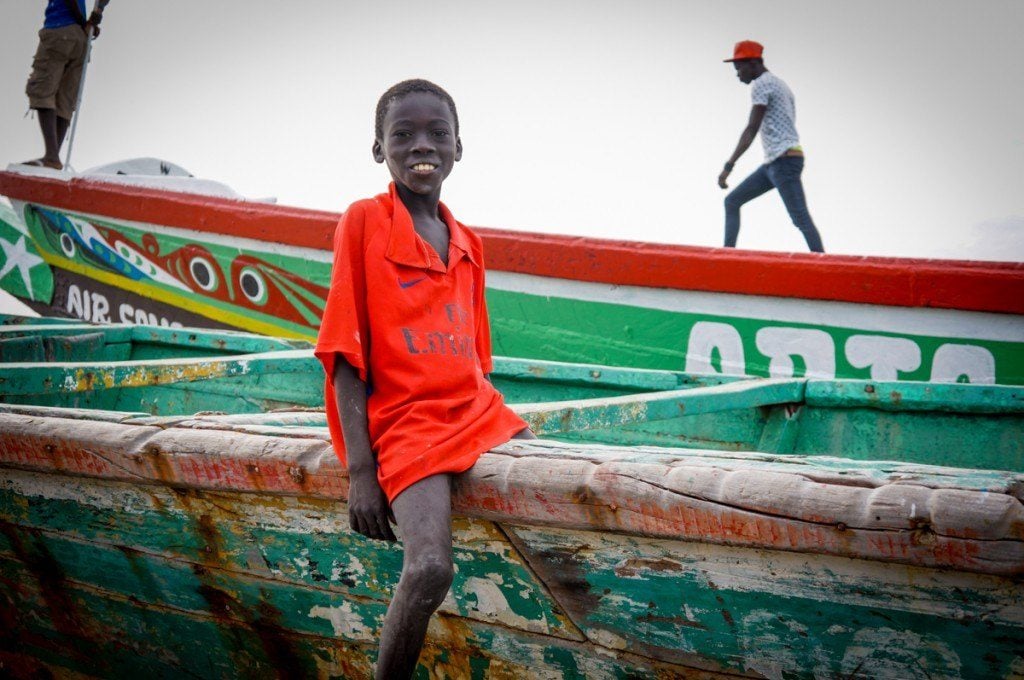
Last November, as the world prepared for the historic UN meeting on climate change in Paris, the Conference of the Parties (COP21), nearly 2,000 people gathered in the traditional fishing village of Bargny, Senegal with a mission of their own. Led by Hann Baykeeper Mbacke Seck, Africa’s first Waterkeeper, and Bargny Coast Waterkeeper Fadel Wade, they assembled from five Senegalese villages, each of them facing the threat of proposed coal-fired power plants, to march united under one message: “NON au charbon,” or “NO to coal.”
Bargny is 25 kilometers down Senegal’s Atlantic coast from Dakar. It is a community in which anthropogenic climate change, largely attributed to carbon emissions, has already wreaked havoc. One block away from the street where the march was held, piles of rubble sat on the beach, remnants of centuries-old concrete dwellings demolished when an unprecedented storm surge, driven by Hurricane Fred last spring, pummeled the village with giant ocean waves. Powerful storms like Fred, caused by rising ocean temperatures and other climatic changes, have extended further east than ever before, threatening many villages along the west coast of Africa. And these storms are predicted to increase in intensity and frequency. The Atlantic Ocean, the foundation of life and tradition in Bargny, is now one of the greatest threats to its future.
Senegal, along with many other developing countries, faces an unprecedented dilemma. On one hand, reliable access to electricity is critical to lifting the country’s population of 13 million out of poverty. On the other hand, one of the “cheapest” sources of electricity, coal-fired power plants, not only introduces new sources of deadly air and water pollution to surrounding communities, but also exacerbates the climate change that disproportionately affects people in developing countries, who are often the most vulnerable to natural disasters. Former United Nations Secretary-General Kofi Annan has said of Africa that “no region has done less to contribute to the climate crisis, but no region will pay a higher price for failure to tackle it” – a statement that points to Senegal’s struggle to achieve both economic development and protection of its environment. For the participants in the Bargny March for the Climate, burning more coal cannot be part of the solution to this complex problem.
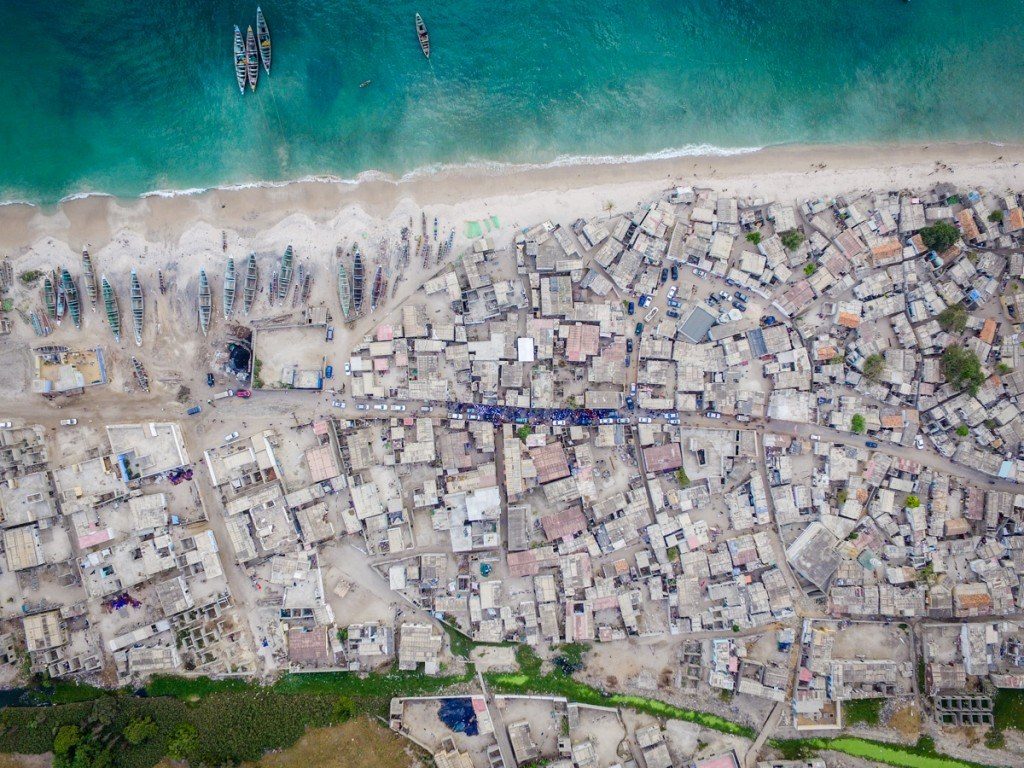
Currently Senegal has no operational coal-fired power plants. But less than 500 meters from the village of Bargny stands the partially built 125-megawatt Sendou power station, which would be fueled with coal. In 2008, a Swedish-led consortium backed by the Senegalese government began building this facility. Sendou is one of several new proposed coal-burning facilities that would, in addition to bellowing countless tons of climate-changing carbon dioxide out its smokestacks, generate huge quantities of coal ash laden with dozens of toxic chemicals from arsenic to zirconium that would likely pollute the groundwater beneath the village as well as surrounding wetlands, streams, and the ocean itself. Plans for the plant, moreover, call for a once-through cooling-water system, which would kill millions of marine organisms by sucking up enormous amounts of seawater, then spit it out at temperatures approaching or exceeding 100° F.
Other communities in Senegal are facing a similar predicament. To the north of Dakar is the town of Mboro, whose traditional economy has relied on mangroves and the sea-life that mangroves attract. Destructive floods, occurring yearly, have made it necessary to shift mangrove farms inland. Mangrove wood serves as a valuable fuel and material for building houses, but the Mangroves function most importantly as habitat for sea life, including oysters, that have allowed Mboro and other coastal villages to thrive. As in Bargny, the effects of climate change are disrupting ecosystems and daily life in Mboro. Yet the Senegalese power authorities and other international investors have proposed another coal-fired power plant for Mboro. In response, villagers travelled over 100 kilometers to march in Bargny, as did residents from three other villages facing similar proposed coal projects.
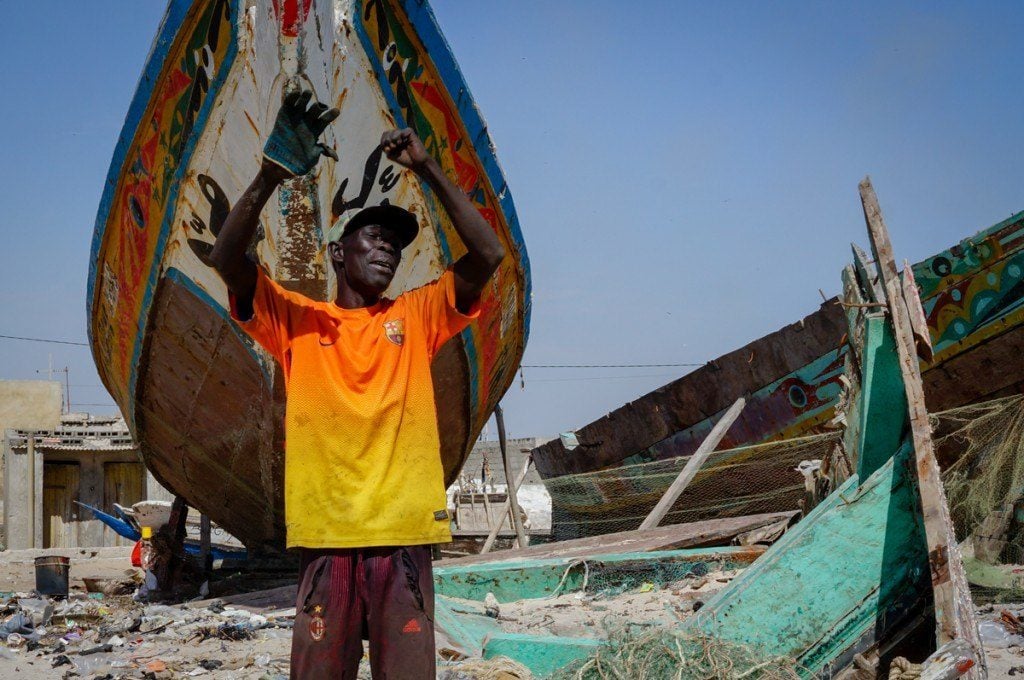
The Bargny March for the Climate was both an expression of local resistance and a call for global action. The Waterkeepers and other community groups that organized the March penned the “Declaration of Bargny,” an appeal to Senegal’s President Macky Sall, urging him to take a stand against new coal projects at COP 21 in Paris. These communities, facing the direst consequences of climate change, appealed for permanent cancellation of plans to build the Sendou plant and other proposed power plants in Senegal, and for a national shift to focus on renewable sources of energy. The Declaration also described the threats that coal poses to water resources, agriculture, fish and other wildlife, public health and the economy.
Virtually the entire economy of coastal Bargny is based on the marine life that is threatened by a warming climate. In an overview of the risks facing Senegal, the World Bank predicted that temperatures in the region will increase between 1.1 and 3.1 degrees Celsius by 2060, and it noted that “sea level could rise by up to one meter by the end of the century, and this would put at least 110,000 people, mostly in southern Senegal in the Cape Verde region, at risk of coastal flooding.” Unprecedented rainfall patterns, more aggressive storms and sea-level changes would also cause erosion of the coast.
According to Daouda “Larry” Gueye, executive director of Bargny Coast Waterkeeper, the encroachment of the sea has made Bargny one of the four most endangered areas in Senegal. The havoc wrought by Hurricane Fred made climate refugees of many Bargny and Hann Bay families who lost their homes. In response to the recent displacements, Bargny’s local government granted tracts of land further inland large enough to settle the 1,433 families whose homes were destroyed or who are threatened by recurring storm-surges.
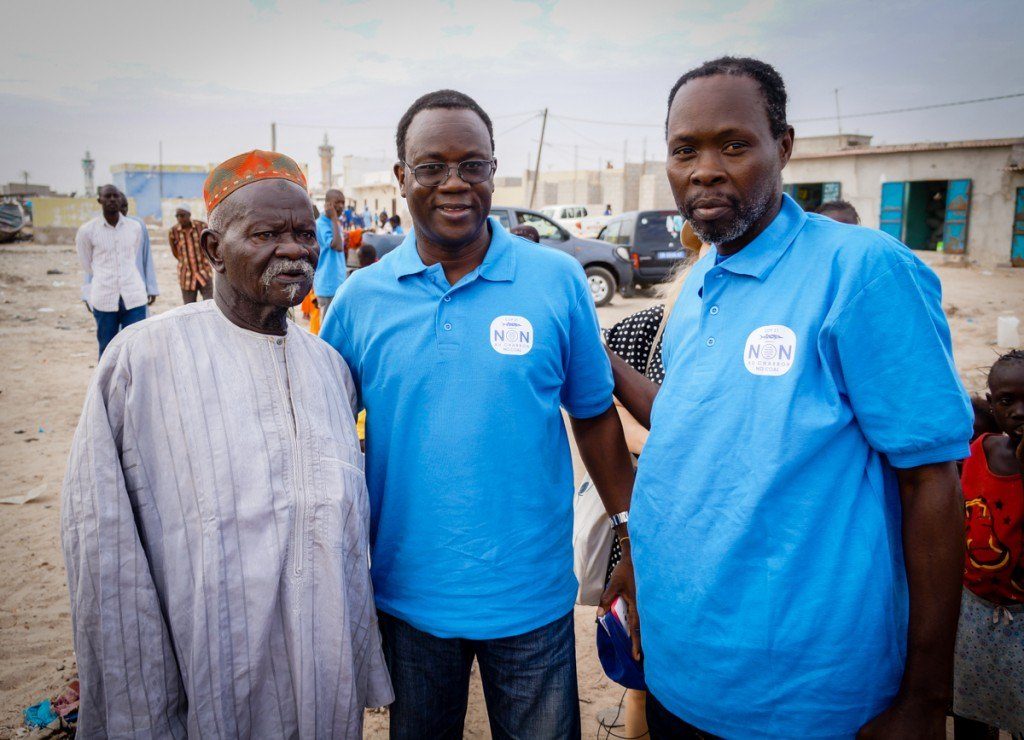
But it is a bitter irony that some of the land granted to construct the coal plant overlaps with the land promised to those whose homes were destroyed. A coalition of public-interest groups has filed a legal challenge accusing the Sendou’s developers of ignoring a provision of Senegalese environmental law that prohibits the construction of industrial facilities within 500 meters of a dwelling. The groups accuse the developers of failing to identify the rightful owners of the land, as well as the people who inhabited it, before beginning construction and building a wall around the disputed area. “Some had already started building their houses,” said Fadel Wade, the Bargny Coast Waterkeeper. “They came and they chased away those who were already building.”
In addition to neglecting the land grants, Gueye and Wade pointed to geographical data showing the site of the plant lies 139 meters from a fish-processing site that employs 1,000 women from the village; it is 395 meters from a daycare and health center, 231 meters from the houses that those displaced by the storms had begun to build, and 520 meters from a primary school.
“Our first goal is to protect us from the sea,” said Gueye, through a translator. “Our second goal is to fight the coal power plant.”
The 125-megawatt Sendou power station was proposed to supplement the supply of electricity being demanded by a country bent on an ambitious program of economic development. The National Electricity Board in Senegal commissioned the Swedish company Nykomb Synergetics Development Group to develop it.
According to an African Development Bank report, the plant would provide about 12 percent of the country’s annual power consumption projected for 2052, and would help spur the spread of development to the south. The cooling intake vacuums for the Sendou plant would be high-pressured to draw 15,000 cubic meters of seawater per hour. An absence of filters means that fish, along with their eggs and other marine life, would be sucked in, crushed or boiled by the heat produced. So the process would affect the entire food chain as generations of eggs are destroyed.
“The suction and discharge of seawater would be in a marine-protected co-management area funded by the World Bank, which aims to protect an important sourcing and breeding area and to restore fishery resources,” said Gueye. The sudden and drastic release of large amounts of heated water could also obliterate centuries of adaptation to changing sea temperatures that the fish have undergone, and villages like Bargny, which rely so heavily on the productivity of the sea, face the demise of an economy and way of life that have bound people together for just as long.
“That’s the threat from the power plant,” said Donna Lisenby, the Clean and Safe Energy Campaign manager for Waterkeeper Alliance. “If it is built it will destroy the environmental and economic viability of a historic fishing heritage and this will be the last generation capable of following in the footsteps of their mothers and fathers to earn a living from the sea.” Lisenby, traveled to Senegal in March of 2015 to train Waterkeepers and other nonprofit leaders on how best to organize and fight proposals to build three coal-fired power plants using data and science. Joining Donna was Waterkeeper Alliance Board Member and Pace Law School professor Karl Coplan who shared information on legal strategies.
“Since the beginning, the developers have been manipulating the information and giving the wrong information to the mayor and the mayor’s officers,” said Gueye.
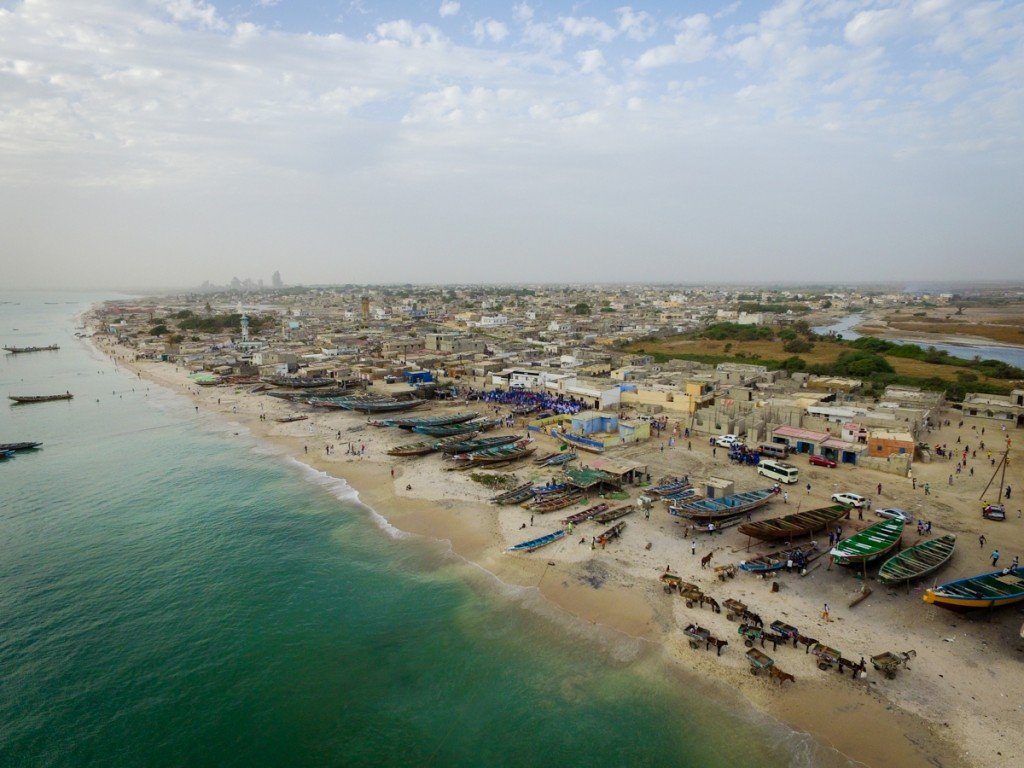
Amid this deception and determination to complete this noxious facility, Waterkeeper Alliance staff, including Lisenby, supplied the Senegalese Waterkeepers and other community leaders with extensive information on the health and environmental concerns associated with coal-fired power plants. They in turn have been educating citizens about the threats and how to resist them.
The leaders “really wanted to know the truth and the science so that they could then go and share it with their communities,” said Lisenby.
In 2015 construction of the Sendou plant ground to a halt, at least temporarily, because of funding problems and fierce resistance by Bargny residents. Even so, the Waterkeepers in Senegal decided to host the Bargny March for the Climate two weeks before COP21 in Paris, to emphasize the importance for President Sall to take a firm stand against coal at the conference. Wade explained that it was important to proceed with the march because the issues surrounding climate change and coal production weren’t just about Bargny, but also about the path of development that all of Senegal will take.
Data gathered by the World Bank show that 46.7 percent of Senegal’s nearly 15,000,000 people fall under the poverty line. It is clear that the country, like many others in Africa, desperately needs development in order to raise its standard of living. But carbon-dioxide emissions per capita in Senegal are, at .6 metric tons per capita, far below that of other Sub-Saharan African countries. For this reason, Senegal is in a unique position to focus development on renewable sources of energy, such as solar and wind, and remain coal free.
As Kofi Annan wrote in the Africa Progress Panel 2015 Report, “African leaders have every reason to support international efforts to minimize greenhouse-gas emissions. At the same time, they urgently need more power to boost and transform their economies and to increase energy access.”
These potentially conflicting goals were emphasized in the Declaration of Bargny and a highlight of President Macky Sall’s statements at COP21, where the commitments to renewable sources of energy made by the participating nations will, it is hoped, shape decisions about coal in Senegal. The countries’ Waterkeepers, other civil society leaders and citizens are indeed hopeful. Two of the three proposed coal plants in Senegal more than likely have been canceled permanently. Only the Sendou plant in Bargny remains a threat. It is the country’s final fight in its battle to remain coal-free.
Hannah Petersen is a senior at the University of North Carolina-Chapel Hill, where she studies Strategic Communications and Anthropology.
Peter Harrison is a staff attorney at Waterkeeper Alliance and the U.S. Coal Campaign Coordinator.